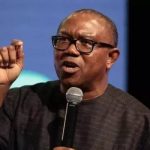
The Muslim Rights Concern (MURIC) has raised a fervent demand for the immediate release or judicial arraignment of AbdulRasheed Bawa, the former chairman of the Economic and Financial Crimes Commission (EFCC), who has been under detention since June 14, 2023. Professor Ishaq Akintola, the Executive Director of MURIC, articulated this call on Thursday, expressing grave concerns over Bawa’s prolonged incarceration without formal charges or public elucidation.
“Abdul Rasheed Bawa has remained in custody without any clear rationale. This runs counter to the principles enshrined in Section 36 of the 1999 Constitution of the Federal Republic of Nigeria, which guarantees the right to a fair hearing,” Akintola stated.
He went on to accentuate that this situation starkly contrasts with the provisions outlined in Section 41 of the constitution, which uphold the freedom of movement for all Nigerian citizens.
In its official statement, the Muslim Rights Concern highlighted the conspicuous absence of communication from the former EFCC chairman or his legal representatives. This raises the critical issue of “audi alterem partem,” a fundamental judicial principle requiring both sides to be heard before a decision is made.
Akintola also expressed apprehensions about the disparate treatment of AbdulRasheed Bawa in comparison to Godwin Emefiele, the former governor of the Central Bank of Nigeria (CBN).
“If Godwin Emefiele has been arraigned in court twice since his arrest, we are left to wonder what unique transgression AbdulRasheed Bawa might have committed to warrant his indefinite detention,” Akintola remarked.
Highlighting the importance of due process, the Director of MURIC lamented the perceived disparity in legal representation, suggesting that Emefiele’s purported access to substantial resources might have contributed to the divergence in their legal proceedings.
The Islamic human rights organization resolutely called for the preservation of Bawa’s fundamental human rights, urging either his immediate release or a transparent arraignment before a court where he can seek bail.
“MURIC insists that he be freed or presented in court, where the charges against him are clearly stated. He must also be granted access to his legal counsel, personal physician, and essential members of his family,” Akintola emphasized.
In conclusion, he envisioned a Nigeria where every citizen is shielded from institutional coercion, tyranny, oppression, and socio-economic marginalization. This call echoes the fundamental principles of justice and human rights that form the bedrock of a democratic society.





Comments are closed.